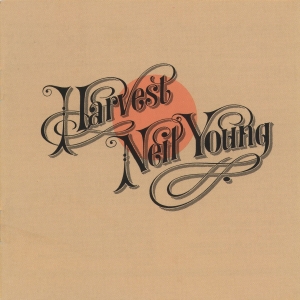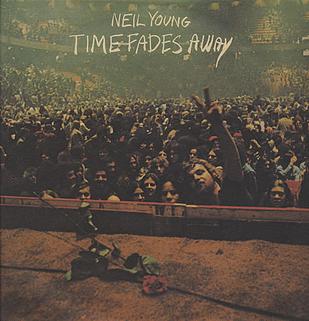Related Research Articles

Harvest is the fourth studio album by Canadian-American musician Neil Young, released on February 1, 1972, by Reprise Records, catalogue number MS 2032. It featured the London Symphony Orchestra on two tracks and vocals by guests David Crosby, Graham Nash, Linda Ronstadt, Stephen Stills, and James Taylor. It topped the Billboard 200 album chart for two weeks, and spawned two hit singles, "Old Man", which peaked at No. 31 on the US Billboard Hot 100, and "Heart of Gold", which reached No. 1. It was the best-selling album of 1972 in the United States.

Time Fades Away is a 1973 live album by Canadian-American musician Neil Young. Consisting of previously unreleased material, it was recorded with the Stray Gators on the support tour following 1972's highly successful album Harvest. Due to Young's dissatisfaction with the tour, it was omitted from his catalogue and not released on compact disc until 2017. The album is the first of the so-called "Ditch Trilogy" of albums that Young recorded following the major success of Harvest, whereupon the scope of his success and acclaim became so apparent that Young subsequently experienced alienation from his music and career.
"Sedan Delivery" is a song written by Neil Young that was first released on his 1979 album with Crazy Horse, Rust Never Sleeps.
"Danger Bird" is a song written by Neil Young. It was first released on his 1975 album with Crazy Horse, Zuma. A live version was also released on the 1997 album Year of the Horse.
"Out on the Weekend" is a song written by Neil Young that was the opening song of his 1972 album Harvest.
"Cowgirl in the Sand" is a song written by Neil Young and first released on his 1969 album Everybody Knows This Is Nowhere. Young has included live versions of the song on several albums and on the Crosby, Stills, Nash and Young album 4 Way Street. It has also been covered by The Byrds on their self-titled album. Like three other songs from Everybody Knows This Is Nowhere, "Cinnamon Girl", "Down by the River" and the title track, Young wrote "Cowgirl in the Sand" while he was suffering from the flu with a high fever at his home in Topanga, California.
"A Man Needs a Maid" is a song written by Neil Young that was first released on his 1972 album Harvest. It is one of two songs on Harvest on which Young is accompanied by the London Symphony Orchestra. It has appeared on several of Young's live and compilation albums.

"Are You Ready for the Country?" is a song written by Neil Young and released on his 1972 Harvest album. The track features Young on piano backed by the studio band dubbed The Stray Gators, comprising Jack Nitzsche on slide guitar, Ben Keith on pedal steel guitar, Tim Drummond on bass, and Kenny Buttrey on drums. Backing vocals on the track are by David Crosby and Graham Nash. The recording was made in a studio set up in a barn on Young's ranch.
"Tired Eyes" is a song written by Neil Young that was first released on his 1975 album Tonight's the Night.
"Pocahontas" is a song written by Neil Young that was first released on his 1979 album Rust Never Sleeps. It has also been covered by Johnny Cash, Everclear, Emily Loizeau, Crash Vegas, Gillian Welch, Trampled By Turtles, and Ian McNabb.

"Will to Love" is a song written by Neil Young that was first released on his 1977 album American Stars 'N Bars. A promotional single of "Will to Love" was released, backed with a live performance of "Cortez the Killer."
"The Old Laughing Lady" is a song written by Neil Young that was first released on his 1968 debut solo album Neil Young.
"From Hank to Hendrix" is a song written by Neil Young that was first released on his 1992 album Harvest Moon. Young has frequently included it in live sets and it has been included on a number of live and compilation albums.
"Unknown Legend" is a song written by Neil Young that was first released on his 1992 album Harvest Moon. Although it was not released as a single, it reached #38 on the Billboard Magazine Mainstream Rock Tracks chart.
"I Believe in You" is a song written by Neil Young that was first released on his 1970 album After the Gold Rush. It has also been covered by other artists, including Linda Ronstadt, Robin Zander and Rita Coolidge. Coolidge's version was released as a single and was a minor hit in Canada.
"Crime in the City " is a song written by Neil Young that was first released on his 1989 album Freedom, although Young had performed longer versions in concert earlier. It was not released as a single but reached number 34 on the Billboard Magazine Mainstream Rock Tracks chart. It is a lengthy song, with a released version of almost nine minutes, but earlier versions were more than twice as long. It has been characterized as a document of moral rot in urban regions of the United States in the late 1980s.

"Everybody Knows This Is Nowhere" is a song written by Neil Young that was originally released as the title track of his 1969 album with Crazy Horse, Everybody Knows This Is Nowhere. The song was written earlier, and a different version was originally considered for Young's 1968 solo debut album Neil Young
"Country Girl" is a song written by Neil Young that was first released on Crosby, Stills, Nash & Young's 1970 album Déjà Vu.

"Come On Baby Let's Go Downtown", also known as "(Come On Baby Let's Go) Downtown" or "Downtown", is a song written by Danny Whitten, possibly in collaboration with Neil Young, that was first released on Crazy Horse's 1971 album Crazy Horse. A live version was later released on multiple Neil Young albums, most famously on his 1975 album Tonight's the Night, and then on his 2006 album Live at the Fillmore East. Phish has covered the song in concert.
"Tonight's the Night" is a song written by Neil Young that was first released on his 1975 album Tonight's the Night. Two versions of the song bookended the album, with one version as the first song, and the other as the last. "Tonight's the Night" has also appeared on some of Young's live and compilation albums.
References
- 1 2 3 Greenwald, Matthew. "Harvest". Allmusic. Retrieved 2020-03-15.
- 1 2 3 4 Williamson, N. (2002). Journey Through the Past: The Stories Behind the Classic Songs of Neil Young. Hal Leonard. p. 39. ISBN 9780879307417.
- 1 2 Thomson, Graeme (2017). "Everybody Knows This Is Nowhere". The Ultimate Music Guide: Neil Young. Uncut. p. 24.
- 1 2 3 4 5 6 7 8 Inglis, Sam (2004). Harvest. Continuum. pp. 76–79. ISBN 9780826414953.
- 1 2 Rogan, Johnny (1996). The Complete Guide to the Music of Neil Young. Omnibus Press. p. 38. ISBN 978-0711953994.
- ↑ Bielen, Ken (2008). The Words and Music of Neil Young. Praeger. p. 21. ISBN 9780275999025.
- 1 2 3 4 McDonough, Jimmy (2003). Shakey: Neil Young's Biography. Anchor. pp. 299–302, 739. ISBN 9780679750963.
- ↑ Downing, D. (1994). A Dreamer of Pictures: Neil Young, the Man and His Music. Da Capo. pp. 87–88. ISBN 9780306806117.
- ↑ Neil Young (February 1, 2022). Neil Young Radio. Sirius XM.
- 1 2 "The 100 Greatest Songs". Neil Young. Rolling Stone. 2014. p. 88.
- ↑ Mendelsohn, John (March 30, 1972). "Harvest". Rolling Stone Magazine. Retrieved 2020-03-15.